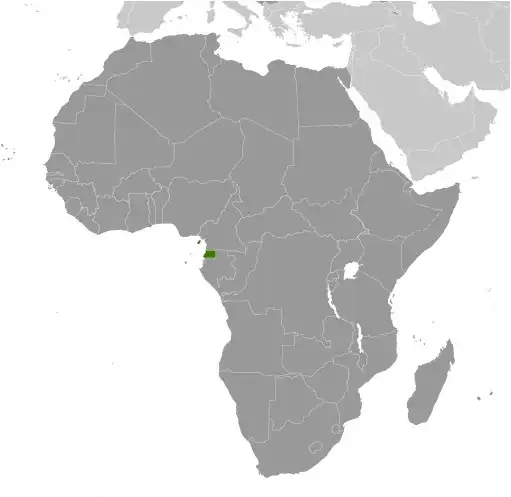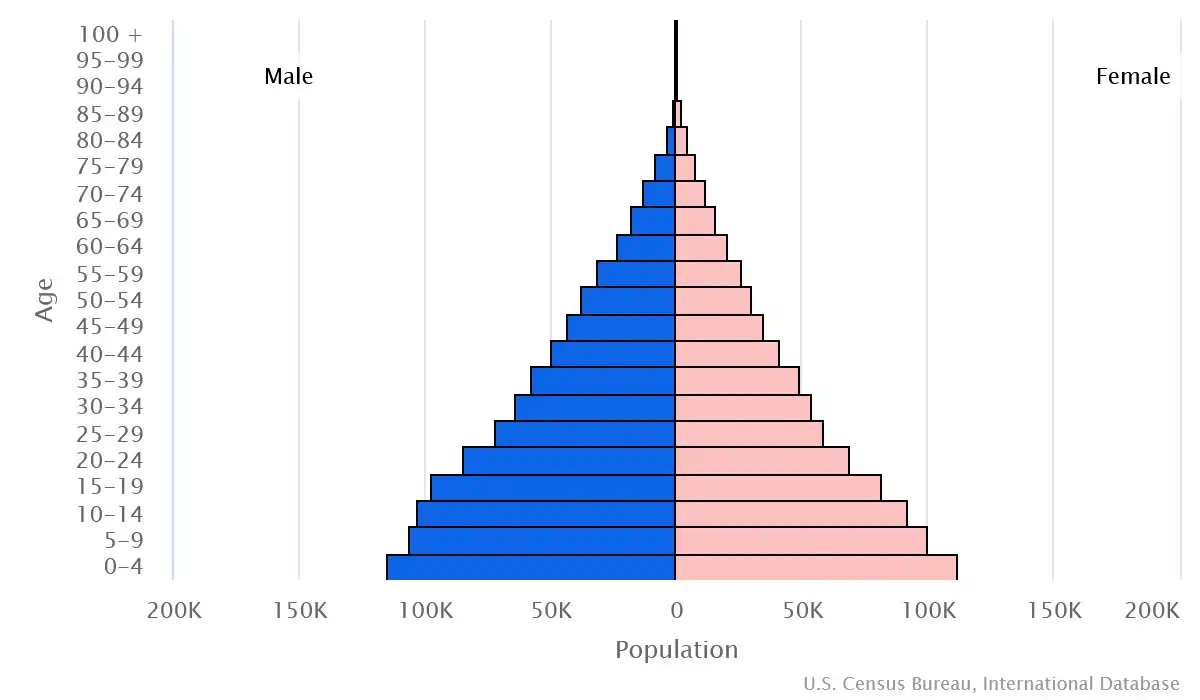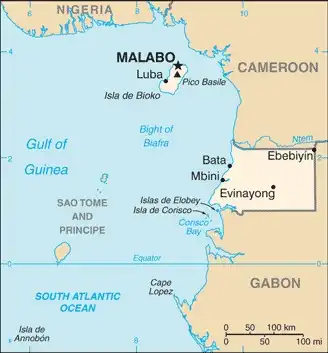
Equatorial Guinea Country Profile
Key Facts of Equatorial Guinea

| Government type: | presidential republic |
| Capital: | Malabo; note - Malabo is on the island of Bioko; some months of the year, the government operates out of Bata on the mainland region. |
| Languages: | Spanish (official) 67.6%, other (includes Fang, Bubi, Portuguese (official), French (official), Fa d'Ambo spoken in Annobon) 32.4% (1994 est.) |
Equatorial Guinea Demographic Data
Ethnic Groups in Equatorial Guinea(2011 est.)
Religious Groups in Equatorial Guinea (2015 est.)
Age pyramid of Equatorial Guinea

Equatorial Guinea Economy Statistics
Economic overview of Equatorial Guinea
growing CEMAC economy and new OPEC member; large oil and gas reserves; targeting economic diversification and poverty reduction; still recovering from CEMAC crisis; improving public financial management; persistent poverty; hard-hit by COVID-19
Equatorial Guinea Real GDP (purchasing power parity) in Billion $
Equatorial Guinea Real GDP per capita in $
Equatorial Guinea's Exports & Imports in billion $
Top 5 Import Partnerin 2022 (73%) of Equatorial Guinea
Top 5 Import Commodities in 2022 of Equatorial Guinea
- ships 🚢
- refined copper 🟧🪙
- iron alloys 🪓
- raw copper 🟧🪙
- poultry 🍗
Top 5 Export Partnerin 2022 (67%) of Equatorial Guinea
Top 5 Export Commodities in 2022 of Equatorial Guinea
- crude petroleum 🛢️
- natural gas 💨
- fertilizers 💩
- packaged medicine 💊
- cars 🚗
Geography of Equatorial Guinea
Map of Equatorial Guinea

Land and Water Distrubtion of Equatorial Guinea
Natural Resources of Equatorial Guinea
- petroleum 🛢️
- natural gas 💨
- timber 🌲
- gold 💰
- bauxite 🪨
- diamonds 💎
- tantalum 🪙
- sand and gravel 🏜️
- clay 🧱
Climate inEquatorial Guinea
tropical; always hot, humid
History of Equatorial Guinea - a Summary
Equatorial Guinea consists of a continental territory and five inhabited islands; it is one of the smallest countries by area and population in Africa. The mainland region was most likely predominantly inhabited by Pygmy ethnic groups prior to the migration of various Bantu-speaking ethnic groups around the second millennium BC. The island of Bioko, the largest of Equatorial Guinea’s five inhabited islands and the location of the country’s capital of Malabo, has been occupied since at least 1000 B.C. In the early 1470s, Portuguese explorers landed on Bioko Island, and Portugal soon after established control of the island and other areas of modern Equatorial Guinea. In 1778, Portugal ceded its colonial hold over present-day Equatorial Guinea to Spain in the Treaty of El Pardo. The borders of modern-day Equatorial Guinea would evolve between 1778 and 1968 as the area remained under European colonial rule.
In 1968, Equatorial Guinea was granted independence from Spain and elected Francisco MACIAS NGUEMA as its first president. MACIAS consolidated power soon after his election and ruled brutally for over a decade. Under his regime, Equatorial Guinea experienced mass suppression, purges, and killings. Some estimates indicate that a third of the population either went into exile or was killed under MACIAS’ rule. In 1979, present-day President OBIANG Nguema Mbasogo, then a senior military officer, deposed MACIAS in a violent coup. OBIANG has ruled since and has been elected in non-competitive contests several times, most recently in 2022. The president exerts near-total control over the political system.
Equatorial Guinea experienced rapid economic growth in the early years of the 21st century due to the discovery of large offshore oil reserves in 1996. Production peaked in 2004 and has declined since. The country's economic windfall from oil production resulted in massive increases in government revenue, a significant portion of which was earmarked for infrastructure development. Systemic corruption, however, has hindered socio-economic development, and the population has seen only limited improvements to living standards. Equatorial Guinea continues to seek to diversify its economy, increase foreign investment, and assume a greater role in regional and international affairs.
